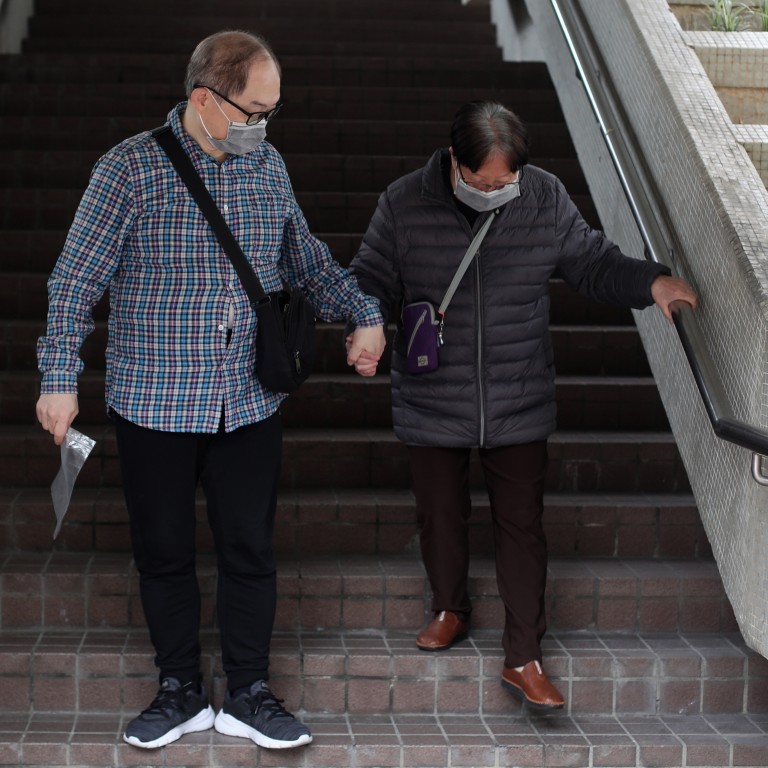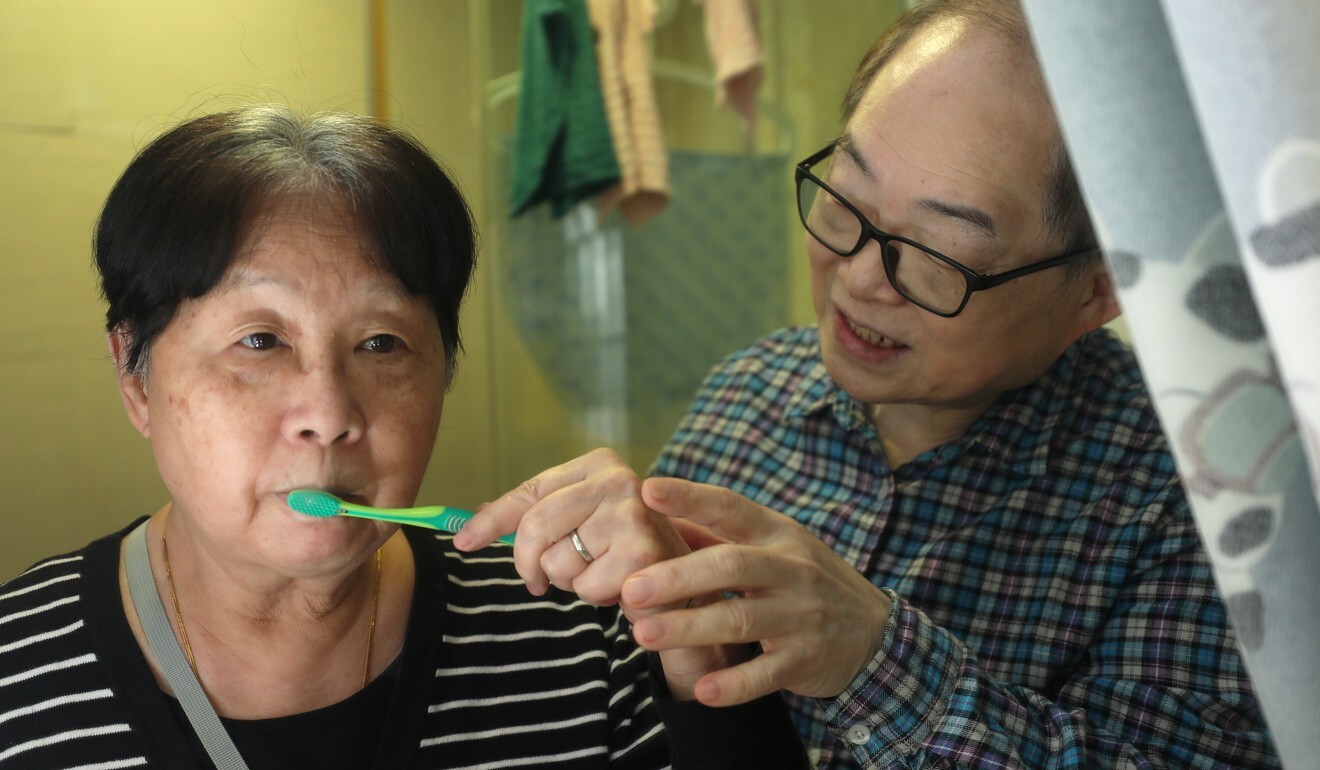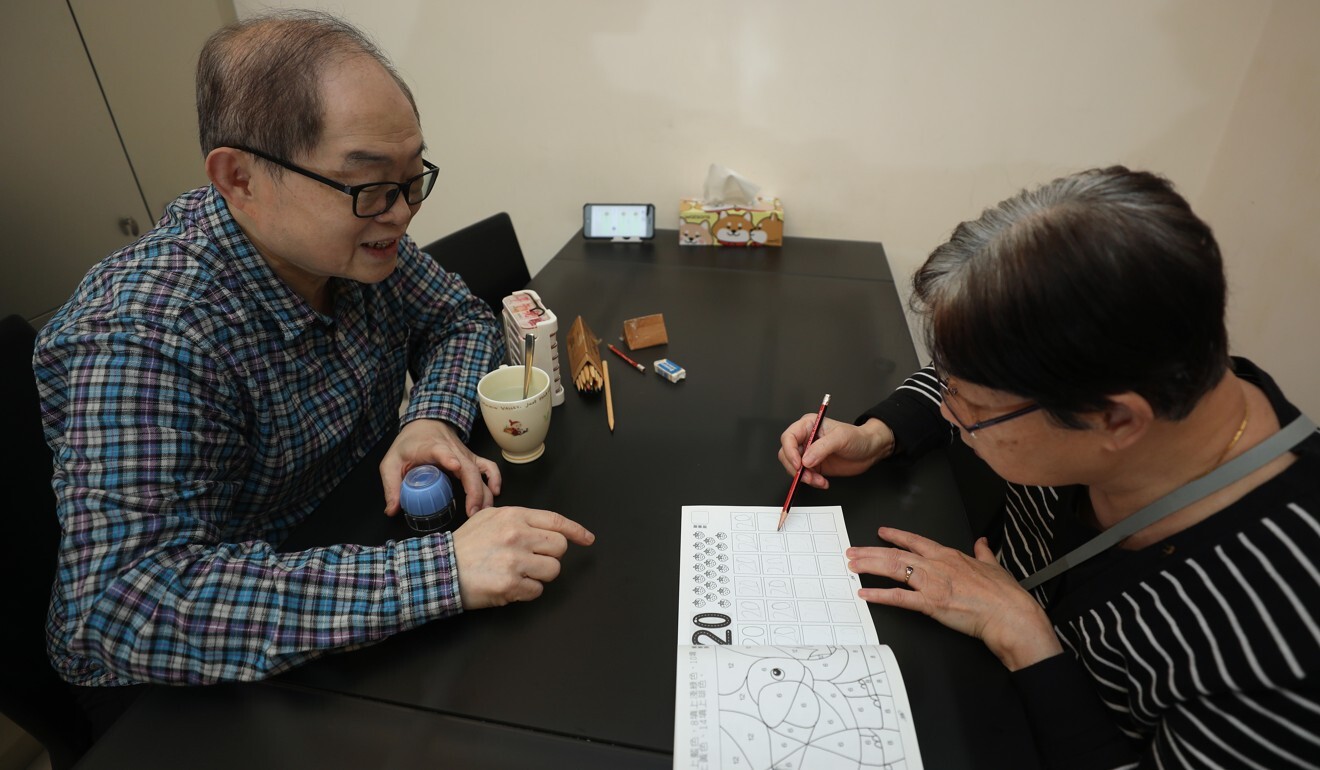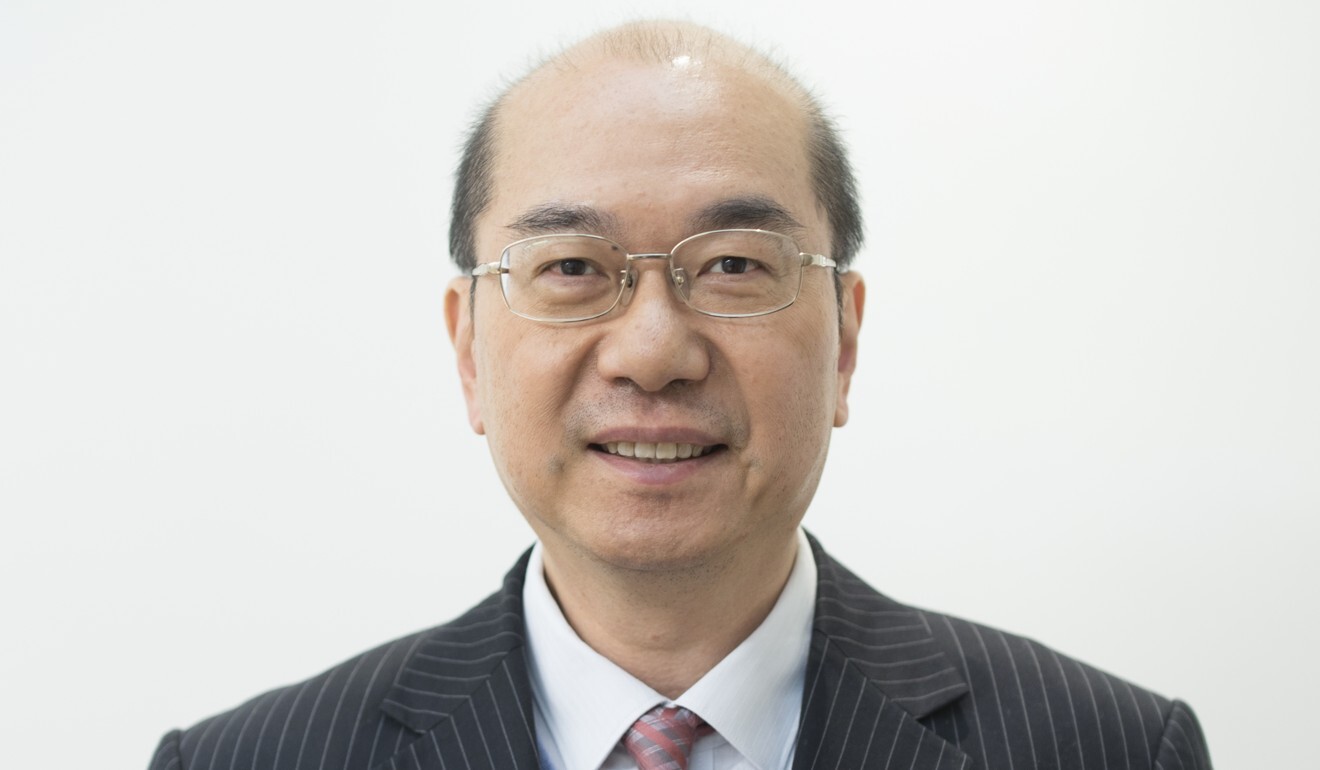
‘I don’t mind if she doesn’t know me,’ says 70-year-old Hong Kong man caring for wife with dementia
- Dementia patients and their carers struggle to cope as pandemic measures disrupt daily routines
- Unable to mix with others, some become stressed, depressed, and display behavioural problems
After taking care of his wife the whole day, Lam Man-hing, 70, finally has a little time to himself before bedtime.
He browses the news, checks messages from friends on his smartphone and watches some television, with his wife Tang Siu-man, 74, asleep by his side.
He checks on her from time to time, and keeps the TV volume low to avoid disturbing her.
In the morning, like every day, she might not remember him.
Tang has Alzheimer’s disease, a progressive form of dementia that begins with forgetfulness and mild memory loss, eventually leading to the inability to recognise loved ones or carry out daily activities.
The Covid-19 pandemic has affected patients like Tang and their carers. The couple’s routine used to include regular outings from their home in Tsuen Wan to Tsim Sha Tsui, or taking part in activities at community centres.
But with many service centres closed since the Lunar New Year holiday to slow the spread of the coronavirus, the couple have had to stay at home most of the time.
My biggest concern is what will happen to her if I’m not there. Nobody will be able to care for her as well as I do
The coronavirus has killed more than 270,000 people and infected more than 3.8 million worldwide. Hong Kong has recorded more than 1,000 cases, four of whom have died.
Doctors say elderly dementia patients are more vulnerable amid the pandemic, with all the restrictions that have disrupted the lives of Hongkongers.
Tang was diagnosed with the disease eight years ago, but her condition has deteriorated sharply over the past three years. At first, she was forgetful. Then she could not remember her way home and got lost several times.
The ‘dementia tsunami’ and why Hong Kong isn’t ready to cope with expected surge
Lam had to make sure his wife of 45 years carried a card with her name and address when she went out, as well as a mobile application to track her movements.
Then she forgot his name, their two adult children’s names, and eventually her own name.
“I don’t mind that she does not remember who I am,” Lam, a retired textile industry worker, says. “As long as she feels comfortable and safe around me, that’s enough. I just want to make her happy every moment we are together.”
He says she gave him love and support through his bouts of serious illness over several years, when he was stricken with cancer and needed surgery thrice.

Now moderately healthy, Lam insists on caring for his wife himself, while their son and daughter, both in their 40s, live with their own families and visit on weekends.
He helps Tang with everything from washing her face and brushing her teeth, to taking a shower. She has become much slower both physically and mentally, he says.
Hong Kong must do more to care for the elderly
Lam created a small photo wall at their home, with pictures and labels that name everyone in the family, including the couple’s two grandsons. Every day, he takes Tang to look at the photos, points out their family members and tells her each person’s name.
To keep her spirits up, he stays by her side and watches as she scribbles numbers. He also plays simple games with her – activities he learned while working part-time, taking care of the elderly with dementia at a help centre some years ago.
For a change of scene, he takes her for a walk in their neighbourhood, never letting go of her hand to make sure she does not wander away.
“Since she lost her ability to care for herself, things have become difficult. I have to arrange everything for her and keep reminding her,” he says. “Sometimes, I feel so tired.”

Dementia generally occurs among people over 65, and the risk increases with age. There is currently no cure for it.
The prevalence rate of dementia in Hong Kong is estimated to be 5 to 8 per cent among those over 65, and 20 to 30 per cent among those over 80.
Dr David Dai Lok-kwan, a specialist in geriatric medicine, says many dementia patients have been affected by the pandemic because they have no awareness of how to protect themselves, including by wearing masks.
Social-distancing rules and confinement measures have also deprived them of mixing with others and disrupted their daily schedules, resulting in stress, depression and behavioural problems, he says.
Dai, chairman of the non-profit Hong Kong Alzheimer’s Disease Association, says regular training and therapy are important for the brain health of those with dementia.
“The months-long suspension of these activities has made their conditions deteriorate,” he says.
He advises that patients exercise regularly, engage in activities such as drawing at home, and even go out sometimes with proper protective measures.
The stress on the carers can be overwhelming, especially in two-person households where the spouse is the only carer
Leung Chu-hei, head of service at the Jockey Club Centre for Positive Ageing, says the NGO dedicated to the elderly with dementia has been receiving more than 100 phone calls a month from patients and their carers seeking help amid the pandemic.
He has noticed physical and mental deterioration in many patients, and their carers have also experienced increasing pressure.

“The stress on the carers can be overwhelming, especially in two-person households where the spouse is the only carer,” he says.
Professor Timothy Kwok Chi-yui, from the department of medicine and therapeutics at Chinese University, says looking after people with dementia is demanding and carers can get overwhelmed.
These patients require company, round-the-clock supervision, and a schedule of physical exercise, training and activities that keep them occupied and are good for the brain.
Third of Hongkongers over 80 will have dementia by 2050
The condition of some patients worsened amid the pandemic, leaving their carers unable to cope with the crisis, says Kwok, who is also the director of the Jockey Club centre.
Leung says staff at the centre have seen their workload increase, providing more one-on-one services, while having to make constant adjustments to meet the latest Covid-19 measures.
With many patients staying away due to the pandemic, the centre has also seen its revenue halved, he says.
For Lam and his wife Tang, life goes on even as Hong Kong begins to gradually ease up on its restrictions.
He says he has never thought of giving up on his life partner, even as her condition has deteriorated.
“My biggest concern is what will happen to her if I’m not there. Nobody will be able to care for her as well as I do,” he says.
Help us understand what you are interested in so that we can improve SCMP and provide a better experience for you. We would like to invite you to take this five-minute survey on how you engage with SCMP and the news.

